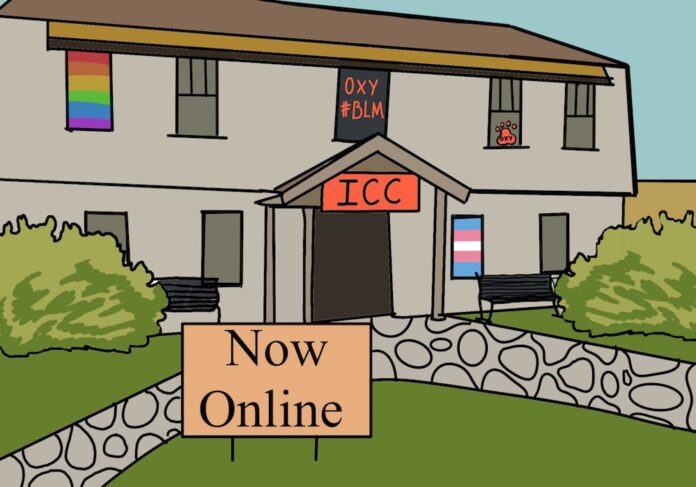The Intercultural Community Center (ICC) serves as a vital space on campus for support and relief for students who identify as BIPOC, LGBTQIA+, low-income and first-generation college students. Due to the college’s remote instruction policy for the fall semester, all of the ICC’s programming, initiatives and services for the semester will be offered virtually for the Occidental community.
To reformat for the fall semester, the ICC is planning a series of Zoom functions and remote events. From Sept. 1–4, the ICC hosted eight Fall Cultural Gatherings over Zoom — Multi Student Social, Religious & Spiritual Student Social, First Gen Student Social, Middle Eastern and North Africa (MENA) Student Social, LGBTQIA+ Student Social, Black Student Social, Latinx Student Social and Asian Pacific Islander Desi Americans (APIDA) Student Social. According to Chris Arguedas, director of the ICC, this was the first year the ICC hosted a mixer for those who identify as MENA.
Arguedas said an average of 15–30 students — mostly returning students and some alumni, staff and faculty — attended each of the gatherings. Smaller conversations were facilitated using Zoom’s breakout room feature.
“The takeaway of those [breakout groups] was that students have a chance to meet somebody they didn’t know before,” Arguedas said. “People shared stories about their culture, about their identity. We always like to pose the question of what do you hope for this year, and how can the ICC support that.”
According to Arguedas, the online space did pose its own set of challenges, from navigating Zoom as a platform to making the meetings accessible for everyone, especially new students. Recognizing the unique challenges first-year students are facing while remote, Arguedas said via email that the ICC plans to host a film screening of “Disclosure” Sept. 29, which he hopes will be less intimidating for students than joining a Zoom call. The screening will be open to faculty, students and alumni.
One program the ICC is planning to finalize during the remote semester is the Lived Name and Pronoun Policy, a step towards creating a more inclusive and non-discriminatory environment, according to Arguedas. The policy will allow students to change their first name and pronouns through the MyOxy student gateway, which will then appear on internal Occidental databases. However, students’ legal names will still be used on transcripts, diplomas, financial aid documents, visa documents and W-2 forms, in addition to bills and some mailings from Occidental, according to General College Policies in the Student Handbook.
Another initiative that the ICC has planned is the exhibition “Belonging in the Academic Commons”, beginning Sept. 15 in partnership with the Academic Commons and Special Collections and College Archives. Micol Garinkol ’19, ICC office supervisor and assistant for inclusive services, said the collection celebrates typically underrepresented national holidays, a continuation of last year’s exhibits for Black History Month and LGBTQ+ History Month. This September will be Latinx Heritage Month, according to Garinkol.
“Last year, we did LGBT History Month and Black History Month, where we basically curate workshops, online book collections. Special Archives puts together an online historical exhibit about Black history, LGBT history,” Garinkol said. “These were all physical programs that we hosted in 2019, but in 2020 we’re going to be doing all of this online. It’s going to be e-book collections, online workshops and online historical exhibits from Special Archives.”
During the remote semester, the ICC will also be introducing the Black Action Plan (BAP), a college-wide program advocating for more resources for Black students. According to an Aug. 26 email from President Harry J. Elam, Jr., the BAP is an intentional response to the needs of the Black community at Occidental, seeking to develop a transformative change through palpable goals, in order to assert the voices of the Black student community.
Esther Karpilow (junior), an equity ambassador at the ICC, said she worked on various subcommittees of BAP over the summer, including the Bias Incident Response Team (BIRT), a support system for individuals experiencing microaggressions and anti-Blackness. According to Karpilow, BIRT looks to center wellness and healing for victims, while holding perpetrators accountable for their actions. Karpilow said her work with BAP is informed by her experiences as a Black student, and she encourages other Black students to get more involved with the ICC.
“There have been times when I felt Oxy will tokenize certain Black students and try and make an individual represent the whole community, which is just not possible,” Karpilow said. “I try and speak to the things I know I’ve needed as a Black student personally at Oxy.”
For Arguedas, successfully engaging students with the ICC during the remote semester will encompass both diversifying ICC programming and initiatives, and building one-on-one connections with students. According to Arguedas, Karpilow is one of five students who will be working as Equity Ambassadors at the ICC, and the Equity Ambassadors will play an important part in meeting students’ needs this semester.
“I’ve talked to lots of students who, even after we’ve met, don’t necessarily feel comfortable stepping into a space. Maybe they don’t feel like enough of that identity, or they don’t know anybody there. All of the things that are true when we’re not remote, are heightened now, and so I’ll really rely on that team to be that invitation and that hand,” Arguedas said.
![]()































